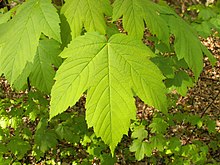Maple
Maple (Latin name Acer /ˈeɪsər/) is a genus of trees or shrubs. Sometimes they are put into a family of their own, the Aceraceae. At other times they are included in the Sapindaceae. To include them in the Sapindaceae is the more modern classification. There are between 100 and 200 species of maples. Most species are native to Asia, but some also occur in Europe, Northern Africa, and North America.
| Maple Temporal range:
| |
|---|---|

| |
| Acer pseudoplatanus (sycamore maple) foliage | |
| Scientific classification | |
| Kingdom: | Plantae |
| Clade: | Tracheophytes |
| Clade: | Angiosperms |
| Clade: | Eudicots |
| Clade: | Rosids |
| Order: | Sapindales |
| Family: | Sapindaceae |
| Subfamily: | Hippocastanoideae |
| Genus: | Acer L. |
| Species | |
|
See either | |

| |
| Distribution | |


The word Acer comes from a Latin word meaning "sharp". It was given because of the characteristic sharp points on the maple leaves. The first person to talk about the genus that way was French botanist Joseph Pitton de Tournefort in 1700. The type species of the genus is Acer pseudoplatanus (the sycamore maple).[1]
''Theophrastus began the daunting task of applying specific names to plants, such as the maple, which was previously called several different names by various communities in ancient Greece''.
Seed dispersal
changeThe maple's distinctive fruit are called samaras, and known by many children as "helicopters" by the way they spin as they fall. Inside the fruit are found their seeds, which are in pairs. Each one is enclosed in a "nutlet" attached to a flattened wing of papery tissue. They are shaped to spin as they fall and carry the seeds a considerable distance on the wind. One tree can release hundreds of thousands of seeds at a time. Some seeds can remain in the soil for several years before germinating.
What are maples used for?
changeMaple trees are often planted as ornamental trees in cities. Some species resist the cold rather well. Sugar maples are grown to make maple syrup. Some maples are grown for timber (wood that is used for furniture).
Symbolism
changeReferences
change- ↑ van Gelderen C.J. & van Gelderen D.M. 1999. Maples for gardens: a color encyclopedia.
2. edited by Tom Jackson, BIOLOGY : an illustrated history of life science